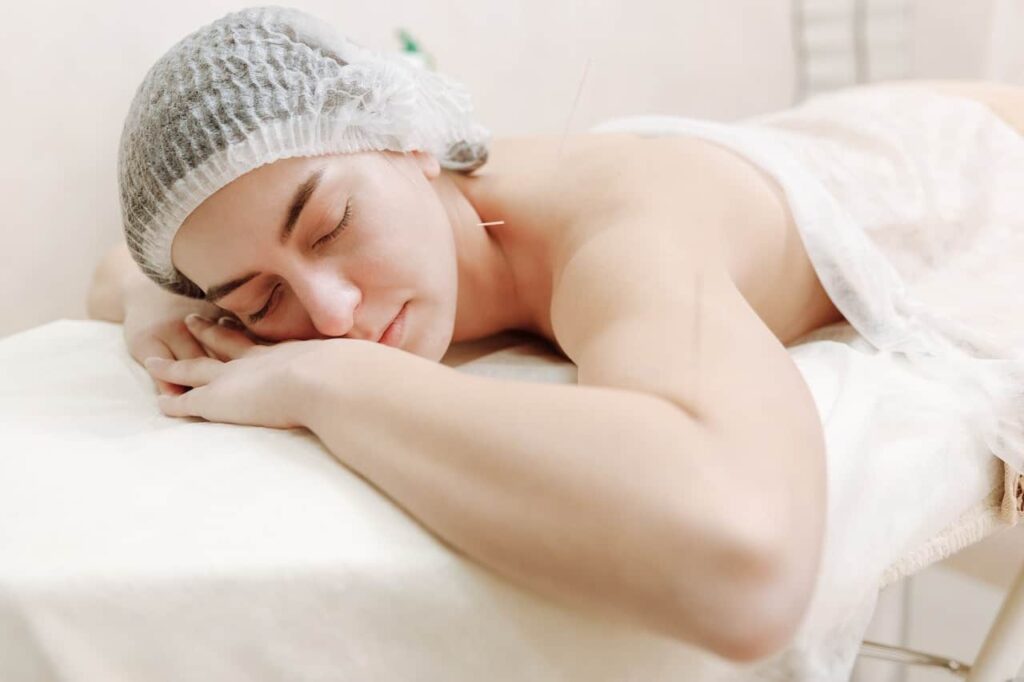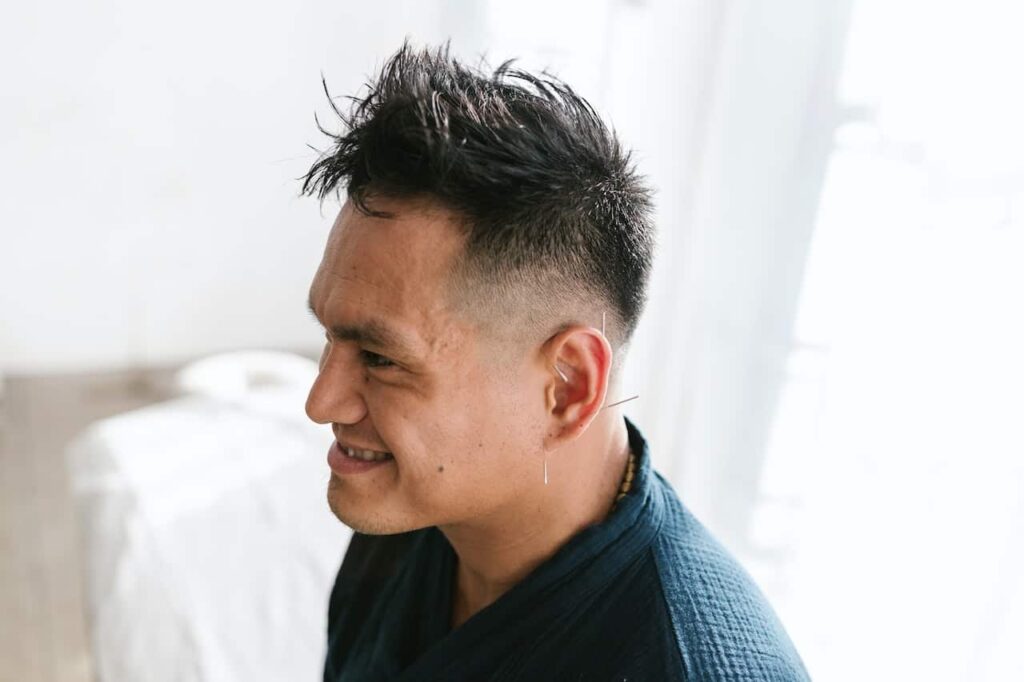Last Updated on March 15, 2024
Wondering if acupuncture can work for TMJ? Inner Gate Health & Wellness explains why you may want to try acupuncture for TMJ.
Causes of TMJ
TMJ affects roughly 5-12% of the US population. For many, TMJ can be excruciatingly painful and even debilitating. Several common factors can cause a person to develop TMJ:
- Poor posture: Being hunched over a computer, lugging around a heavy backpack, sleeping in the wrong position, or developing forward head posture can all cause TMJ.
- Gum chewing, hard foods, or chewy foods: When we chew food that requires excessing chewing, it can strain your jaw and cause pain.
- Dehydration: If you don’t drink enough fluids, your joints will wear away from lack of lubrication.
- Stress: Some people clench their jaw from stress, which is never good. If you catch yourself clenching your jaw, try to stop.
- Vitamin D deficiency: If you don’t get enough vitamin D, it can deteriorate your bone health and muscle contraction. If you can’t get sun, take a vitamin D supplement.
- Hormone fluctuations: This mainly occurs in women during menopause and pregnancy when their hormone levels fluctuate dramatically.
If you suspect you may have TMJ, you’ll want to talk to your doctor to start treatment and reduce any factors contributing to your jaw pain.
Benefits of Acupuncture for TMJ
Several studies have found that acupuncture can help heal and relieve symptoms of TMJ. Patients who receive acupuncture treatments may:
- Relieve discomfort and pain: The pins will trigger the release of serotonin and endorphins, which are natural painkillers.
- Improve movement in opening and closing the jaw: Placing the pins around the jaw will stimulate muscle mobility that can increase the jaw’s range of motion.
- Reduce inflammation: The pins trigger the production of cortisol that fights inflammation.
- Relieve stress: Acupuncture releases the tension in your jaw’s muscles and releases hormones in the body that manage your body’s stress response, creating a relaxing sensation.
Need an appointment now for your TMJ pain? Book an appointment with one of our experienced clinical acupuncturists.
Related Link: Acupuncture and Shoulder Pain

How Acupuncture for TMJ Works
The acupuncture pins stimulate the nerves in the jaw, changing the signaling quality along the nerve cells. By modulating the release of neuropeptides and neurotransmitters, the acupuncture pins suppress nociceptive trigeminal nucleus caudalis and spinal dorsal horn neurons, which can speed healing and repair nerve damage.
Acupuncture also stimulates endorphins, which can dampen and block pain reception in the brain and relieve stress caused by jaw pain. The pins are typically placed in the following areas to relieve TMJ:
- Earlobe
- Face
- Jaw
- Hand
- Foot
- Above the hyoid bone in the neck
- Elbow
- Knee
Several trigger points on the body can affect your jaw’s ability to heal. But the majority of pins will likely be placed on the trigger points of the masseter, lateral pterygoid, medial pterygoid, and temporalis muscles around the jaw.
How Effective is Acupuncture for TMJ?
A recent study found that warm needle acupuncture had a 93% effective rate for alleviating TMJ pain and restoring mobility. Standard manual acupuncture also had an effective rate of 86.7%. Of these patients in the study, a majority had full recovery or significant recovery from:
- Swelling and pain
- Headache and tinnitus
- The clicking sound of the jaw
- Jaw mobility
If you’re struggling with TMJ or have many of these symptoms, you may want to consider warm needle acupuncture or standard manual acupuncture for managing or eliminating symptoms.
What to Expect During a TMJ Acupuncture Appointment
When seeing an acupuncturist for TMJ, your first appointment will be the longest because you’ll need to disclose the following for the optimal treatment:
- Detailed medical history
- Family history of TMJ
- Activity levels
- Stress levels
- Diet
- TMJ treatment history before acupuncture
Once ready for treatment, you’ll lie face-up on a treatment table. You shouldn’t need to undress for the appointment because most pins will be in and around your face. However, you may have a few pins placed on other parts of your body, like your hand or foot.
When all the needles have been placed, the acupuncturist may leave the room to let you rest while the pins stimulate your nerves and muscles. You’ll need to rest for about fifteen minutes before the acupuncturist will adjust or remove the pins, depending on the results.
Do you live in Portland and want an experienced, certified acupuncturist? Learn more about our acupuncture services.
Related Link: Acupuncture for Plantar Fasciitis
How Long Does an Acupuncture for TMJ Appointment Typically Last?
When treating TMJ using acupuncture, you can expect your appointment to last between 90 minutes to two hours. Appointment time will largely depend on the severity of symptoms and treatment goals. The acupuncturist will provide a treatment plan after your first visit.
Depending on your severity, you may need a couple of appointments to treat the TMJ fully. After your first appointment, additional treatments will typically take about thirty minutes to complete. The frequency and number of acupuncture treatments will vary based on the severity of your TMJ.

Risks or Side Effects of Acupuncture for TMJ
Acupuncture is generally regarded as a low-risk treatment. But there are some common side effects that you may experience during or after treatment:
- Minor soreness
- Bruising
- Slight bleeding at the insertion point
- Dizziness
Other more serious side effects include:
- Nerve damage
- Hepatitis B
- Dermatitis
- Internal Bleeding
These more serious acupuncture side effects can be avoided if you choose an experienced acupuncturist that uses sterilized pins. Speak to your acupuncturist if you are experiencing some of these serious side effects.
Acupuncture For TMJ is an Effective Treatment Option
A proven remedy for TMJ, acupuncture is an excellent option for patients that suffer from continual jaw pain and mobility issues. Acupuncture can relieve symptoms and stimulate your jaw’s healing. You’ll want to choose a reputable acupuncturist that utilizes sterilized pins to avoid severe side effects.
Inner Gate Health & Wellness has experienced, board-certified acupuncturists that can help relieve your TMJ. If you live in the Portland area, you’ll want to book an appointment to start your personalized treatment plan and get back to normal life.
Related Link: What is Carpal Tunnel?

